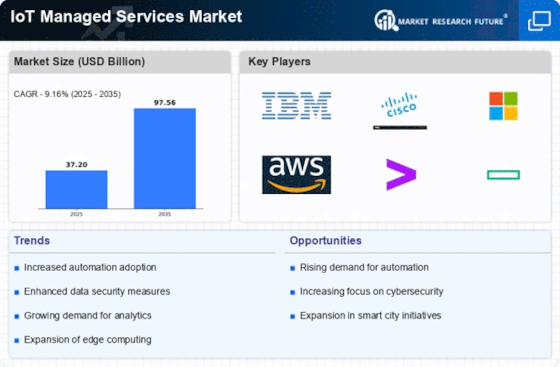Market Share
IoT Managed Services Market Share Analysis
The Internet of Things (IoT) Managed Services market is influenced by a myriad of market factors that collectively define its growth trajectory and impact its dynamics. One of the primary driving forces behind the expanding IoT Managed Services market is the increasing complexity of IoT deployments. As businesses adopt IoT solutions to enhance efficiency and gather valuable data, the need for specialized expertise in managing these complex ecosystems grows. IoT Managed Services providers offer a solution by offering end-to-end management, from device deployment to data analytics, allowing businesses to focus on their core operations while leveraging the full potential of IoT technologies.
Technological advancements are at the forefront of shaping the IoT Managed Services market. The continuous evolution of IoT technologies, including sensor capabilities, connectivity solutions, and data analytics, creates a dynamic landscape. IoT Managed Service providers are tasked with staying abreast of these technological changes to offer clients state-of-the-art solutions. As the IoT ecosystem expands to include a diverse range of devices and applications, the role of managed services becomes increasingly critical in ensuring seamless integration, security, and optimal performance.
Security concerns play a pivotal role in influencing the IoT Managed Services market. With the proliferation of IoT devices and the exponential increase in data generated, ensuring the security of connected devices and the data they transmit is paramount. Managed service providers address these concerns by implementing robust security protocols, monitoring for vulnerabilities, and providing timely updates to safeguard against emerging threats. As security becomes a top priority for businesses adopting IoT, the demand for managed services that prioritize and specialize in IoT security is on the rise.
Moreover, the scalability and flexibility offered by IoT Managed Services contribute significantly to market growth. Businesses, regardless of size, seek solutions that can scale with their evolving IoT needs. Managed services provide a scalable model where organizations can adapt and expand their IoT deployments without the need for substantial upfront investments or concerns about managing increased complexities. This flexibility allows businesses to align their IoT strategies with their growth trajectories, making managed services an attractive proposition.
Market dynamics are further shaped by the increasing diversity of IoT applications across various industries. From smart cities and healthcare to manufacturing and agriculture, each sector has unique IoT requirements. IoT Managed Service providers tailor their offerings to meet industry-specific needs, providing specialized solutions and domain expertise. This industry-specific approach ensures that businesses receive customized services that align with their operational objectives and regulatory requirements.
However, challenges such as interoperability and standardization pose considerations for the IoT Managed Services market. As the IoT landscape comprises a multitude of devices from different manufacturers, ensuring seamless communication and integration becomes a complex task. Managed service providers play a crucial role in addressing these challenges by offering solutions that bridge interoperability gaps, adhere to industry standards, and provide a unified management platform for diverse IoT deployments.
Competitive forces within the market also contribute to its dynamics. The IoT Managed Services space is marked by the presence of established technology players, telecommunications companies, and emerging startups, each vying for market share. Competitive pressures drive innovation and compel providers to differentiate themselves through service quality, pricing models, and the ability to address specific industry requirements.


















Leave a Comment